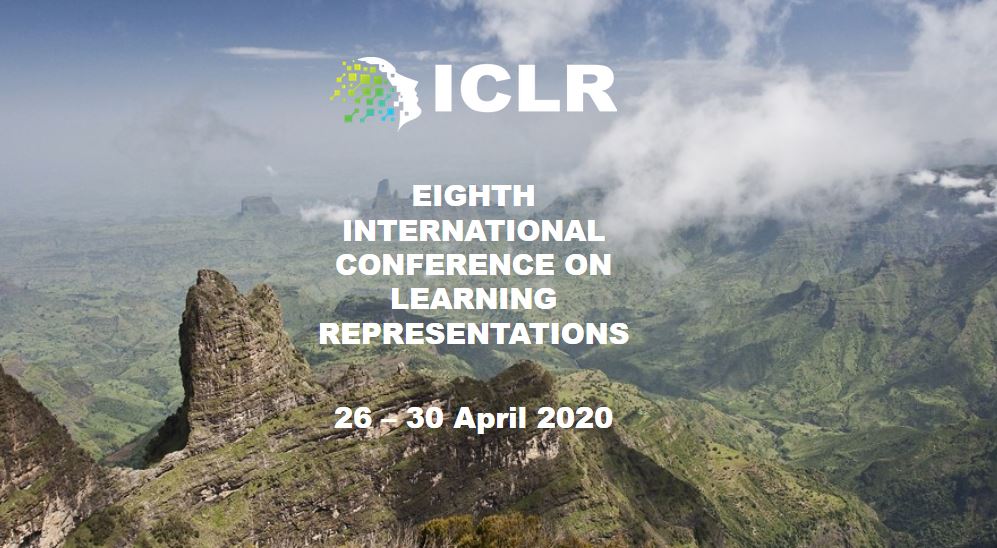Reflections On Iclr 2020
Over the last week of April, I had the opportunity to attend ICLR 2020. ICLR (pronounced "I-clear") is International Conference on Learning Representations, created back in 2013 based on a model by Yann LeCun. It was its 8th edition in 2020 and for the first time ever was conducted virtually due to the coronavirus pandemic. ICLR has gained a reputation over the past few years and has become one of the top conference in deep learning and it has definitely been a conference I wanted to attend. I probably wouldn't have been able to attend, had it been conducted in Addis Adiba, Ethiopia because over the past couple of years deep learning has garnered a large amount of attention and reputation that conference tickets sell within seconds of opening and also that I'm far away from publishing work at ICLR. It's the first conference I've ever attended, and even though virtual might not count, it was a fulfilling experience and I learnt a lot.

I volunteered for the conference and since being the first of its kind, we were asked help to stress test various platforms present that made the conference possible like zoom, rocket chat, slideslive etc. Even though virtual, what I understood at the end was there was a tremendous amount of work and effort that goes into making a conference possible, That it was trying to get the little things right, that made up the conversations, the discussions and the overall experience. I'd suggested a few things that could make the website more user-friendly, which were deployed even during the conference. The volunteers were around the entire time to accommodate people across time-zones.
It probably might have felt differently for people who've attended conference before, but for a first time attendee like me this felt amazing. A week which was filled with entering zoom-based poster sessions, talking to various people about their research and learning a lot of new stuff. A thing that made the conference worthwhile for me were the discussions I couldn't have had with these people otherwise. I had discussions with a variety of researchers who worked on symbolic mathematics, BERT based Neural Machine Translation, Reinforcement learning. Talking to people in the research community through this discussions and Socials(which i talk about next) and asking them how they though about problem, how their research process was like, where they saw there work going next, was enlightening.
Socials made another part of the conference. This was sort of new to me, and we tried the online town by siempre, you can check that out [here](https://theonline.town/), and then went to zoom as well. I attended a social on Creative AI, RL, NLP where people spoke about a wide variety of things. On the RL social, I chanced upon the opportunity to listen to richard sutton, for someone who's just starting out in reinforcement learning (through studying and research and who follows his book), this was akin to a fanboy moment for me and seeing him talk about technical stuff and the way he thought about certain problems was simply put novel to me.
Conference I've learn are also a place where you can learn about new stuff, Although you might be caught with this imposter syndrome of just pretending to be someone you are not, what i've understood through this experience is that most presenters are more than willing to walk you through the idea. I faced this initial reluctance to drop in poster sessions that i did not know about, inherently because the poster sessions were equipped with videos which were paired with slides and also prompted to read the paper sometime after reading the paper it was sort of difficult to ask questions and the bar felt high, but i found that the authors were very welcoming and supporting of discussions and doubts.
I learned a lot through the keynotes that were arranged throughout the week, Ruha benjamin's talk on why considering the various impact things had before the technology was even made and deployed and her statement, "Thinking about computational depth and without historical and sociological depth is superficial" will probably stay with me for a while. I learnt about Neurosymbolic AI in an expo talk, and it was an extremely interesting talk about how systems could be made more generalizable. The keynote on machine learning changing the future of healthcare has made me even more convinced about the little ways in which machine learning changes the various spheres of our life and that this could definitely be one ways in which we democratize health. I'm a lot more interested in interpretable, auto-ml systems after her talk. Devi Parikh's talk on Vision and NLP was an amazing talk, nudging me into considering thinking about the intersection of why Vision and NLP matters. It was a solid recap of where the field has been for the past decade, and where it is going.
Although thoroughly exhausting, spending around 10 hours a day attending poster sessions and talking to the various researchers over socials and poster sessions, this experience was quite inspiring to me. I look forward to going back to my own research filled with this excitement and working and building things. If there is anything I thought could make the conference better was the lack of opportunities to talk to more people in an informal-ish setting.
My notes for the conference can be found here.
The ICLR website has now been available to everyone and you can watch the keynotes and the paper videos as well. The website can be found here.